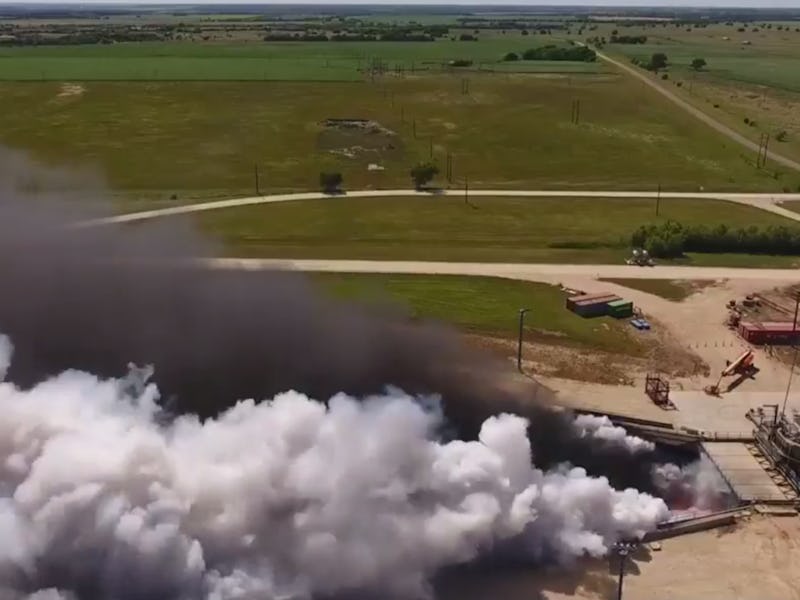SpaceX and Blue Origin are Set to Solve America's Rocket Problem
McCain: "It is a giveaway to the Russian military industrial complex."

Last week, Arizona Senator John McCain loudly pointed out a problem with American aerospace: It doesn’t yet have a modern engine big enough to carry heavy payloads to space. The fact that the only country that does is Russia doesn’t help matters. McCain doesn’t like Russia, doesn’t trust Russia, and certainly doesn’t want to give the Russians any money.
So as expected, the curmudgeonly 80-year-old Arizona Senator wasn’t pleased with the June 15 vote by his colleagues, 96 to 4, allowing American companies to buy engines and other rocket-tech from the Russians. This vote amended a bill that furthers Obama-era sanctions for Russia’s obvious election hacking and the violent 2014 annexation of land from Ukraine.
Arizona Senator John McCain, on the left.
“Have no doubt about what this amendment is, my dear colleagues and friends: it is a giveaway to the Russian military industrial complex,” McCain said while the bill was being debated.
McCain believes that this sanction exception will benefit Russia’s corrupt nexus of politicians and business, and with its passage “the door will once again fly open for taxpayer dollars to be used to subsidize purchases of Russian rocket engines, purchases which line the pockets of Vladimir Putin’s cronies.”
But until the United States can wean itself from Russian rocket engines, the Senate acknowledges that it must swallow this bitter pill. “I think it’s important, over a very short time, that we get off of purchasing Russian rockets,” said Senator Mark Warner, a Democrat from Vermont. “But we need that transition period.”
Helping America do just that are Blue Origin and SpaceX.
The specific component of concern is the RD-180 engine produced by the Russian manufacturer NPO Energomash, which is used by two American rocket companies on two powerful rockets: the United Launch Alliance’s Atlas V and Orbital ATK’s Antares. NASA contracts these companies to blast spacecraft, supplies, and satellites beyond Earth or into its orbit. NASA’s Mars Curiosity rover — which is the size of a car — was launched into space upon the United Launch Alliance’s Atlas V rocket.
Blue Origin's BE-4 engine during a static fire test.
Blue Origin, the rocket company started by Amazon founder Jeff Bezos, is working on just such a replacement for that Russia-made rocket engine, scheduled to debut in 2019. United Launch Alliance is contracting with Blue Origin to put two BE-4 engines in its under-development Vulcan rocket. The BE-4 engine will eliminate American independence on Russian rockets.
A rendering of the Falcon Heavy rocket, which will cost $90 per mission.
SpaceX is in the final stages of finishing a heavy-lifting rocket with its own domestically-made Merlin engines. In early June, SpaceX CEO Elon Musk said that his company will test launch its Falcon Heavy Rocket this fall, as early as September.
In the near term, Russian engines will have to be used, or else missions will be scrapped. “Without this bipartisan amendment, multiple missions on the books today, multiple missions that are already planned today, will be delayed or even cancelled, and would be subjecting the U.S. taxpayers to significant cost increases,” said Senator Cory Gardner of Colorado, where United Launch Alliance is based.
The Russians have provoked the ire of powerful U.S. politicians, notably McCain and then-President Barack Obama, for the past three years. Following Russian aggression and land-annexation in Ukraine, Obama used the power of the executive order to prohibit the United States from doing business with 14 Russian and Ukrainian defense contractors, as well as “individuals in Putin’s inner circle.” More recently, in response to Russian’s election hacking, Obama booted 35 Russian diplomats from U.S. soil, shuttered opulent Russian compounds in New York and Maryland, and imposed further economic sanctions.
McCain might be disappointed by America’s continued reliance on Russian rocket engines, but he may take some solace that the U.S. rocket industry is flourishing, and taxpayer dollars won’t be lining the trouser pockets of Putin’s chums for much longer.